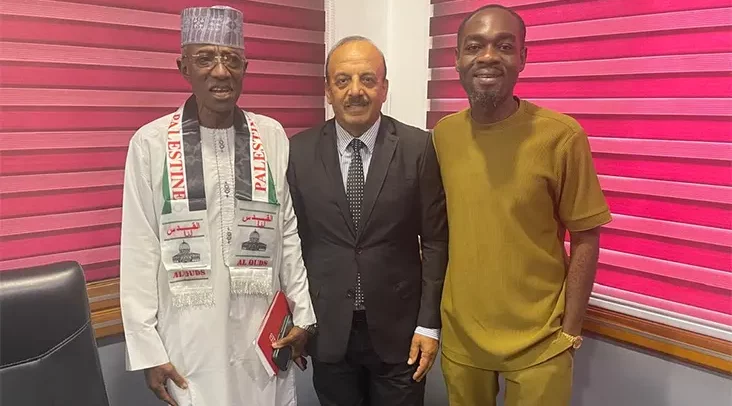Abdulfattah A.K. Al Sattari (Middle) with the
When the Ambassador of the State of Palestine to Ghana, Abdulfattah A.K. Al Sattari paid a courtesy call on Western Publications, publishers of the Daily Guide on Wednesday, he called for peace and de-occupation of his motherland.
A day after the visit, the world woke up to the exciting news about negotiators reaching an agreement towards the restoration of peace in Palestine as part of a 21-point journey.
The visit and the call by the envoy was by all standards auspicious; it was a prayer come true.
The consistent bombardment of Palestine attracted the attention of the world as evidenced by the global demonstrations against what has been described by experts as genocide. No war in recent times has attracted such a magnitude of opprobrium.
The world showed an unusual solidarity with the oppressed people of Palestine.
Some have said that it goes beyond what happened during the holocaust.
Ghana stood on the side of history by stating unambiguously its stand against the killing of mostly women and children.
The massacre of over 60,000 unarmed women and children and the stoppage of the entry of food trucks into the occupied land constituted a crime.
This being the first phase of the agreement which entails the exchange of captives by both sides, Israel and Hamas, it is our wish that unlike other agreements this one would hold. Previous end of hostilities failed to hold.
Some might wonder why we should show interest in what is happening elsewhere in the world when we have our own challenges.
Scholars of international politics would demur because in a global village which the world is, happenings outside our borders have direct or indirect effects on us.
Israel and Palestine are both in the Middle East oil-endowed region whose geopolitics have a direct effect on the world supply and pricing of this energy source.
The Russo-Ukrainian war impacted negatively the economies of the world of which Ghana is a part.
The COVID-19 pandemic emanated from outside our borders, the effects of which visited us worryingly when it made a landfall here.
We cannot fold our arms as avoidable bloodletting goes on in other parts of the world such as the Middle East, especially to which our economy is tied directly and otherwise.
Although there are grey areas in the 21-point roadmap as presented by the US and accepted largely by the two belligerents as it were, it is our hope that Qatar, Egypt including Turkey and Israel will overcome the sticky areas which might rear their heads, especially in the area of total withdrawal of the occupier.
Benjamin Netanyahu, the Israeli Prime Minister, should respect the terms of the agreement and especially make the deal work.
Hamas’ agreement to extricate itself from the future government in Palestine should be underpinned in sincerity.
The eventual creation of a state of Palestine with defined borders and which would not threaten the security of Israel should be the final destination. It is possible if the power broker, the US and Israel herself put their hearts to it.
The war in Gaza was one which could have plunged the world into an avoidable world war.


